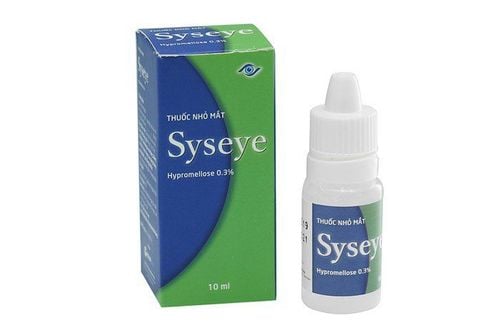This is an automatically translated article.
The article was professionally consulted with Doctor Vo Ha Bang Suong - General Internal Medicine - Department of Examination & Internal Medicine - Vinmec Phu Quoc International General HospitalVitamin A is a type of fat-soluble micronutrient necessary for the growth and development of children, helping to strengthen the immune system and fight infections. However, if you add too much vitamin A, it also leads to many harmful effects on health. So when do we need to take high doses of vitamin A?
1. How does vitamin A affect children?
Vitamin A is an important vitamin for children. Specifically:Growth: Participating in the process of cell division to help children grow healthy and develop normally. Vision: Vitamin A plays a role in protecting vision, helping the eyes to see brighter and clearer, especially at night. Protects the epithelium: Vitamin A protects the integrity of the skin, eye mucosa, trachea, small intestine and excretory glands. Immune: Vitamin A enhances the body's immunity, increases resistance to infections, tetanus, tuberculosis, measles... If vitamin A is deficient, epithelial cells are keratinized and reduced The production of mucus leads to a decrease in the body's resistance to foreign agents such as bacteria, dust,... entering the body. Thus, vitamin A deficiency leads to keratinization of the corneal epithelium which can cause ulceration and blindness. Young children are often slow to develop, susceptible to infections such as respiratory infections, measles, diarrhea, ... and eye diseases such as night blindness, blurred vision, ... can even cause blindness. forever.

Trẻ nhỏ thiếu vitamin A có thể dẫn đến các bệnh về mắt
2. Where is Vitamin A found?
Vitamin A is provided from sources such as:Breast milk, especially colostrum, is rich in vitamin A. Therefore, breastfed babies do not need to take high doses of vitamin A within the first 6 months of life. Food of animal origin such as liver, meat, fish, eggs, milk... Plant-based foods, green, yellow and dark red vegetables such as water spinach, amaranth, spinach , jute vegetables, spinach, broccoli, carrots, pumpkin, mango, papaya, gac... Because vitamin A is fat-soluble, a diet full of fat will help absorb vitamin A well. Children's meals need to be full of protein and fat to help increase absorption and metabolism of vitamin A. Mothers need to pay attention to using a variety of rich and varied foods, processed to suit their taste. with children to help them eat easily and increase absorption. However, in some cases, if vitamin A is not sufficient from food, it may be necessary to supplement high doses of vitamin A with medication depending on the extent of the deficiency.
3. What causes children to have vitamin A deficiency?
Some causes of vitamin A deficiency in children can be mentioned as follows:Children are not breastfed. The child's diet does not provide enough vitamin A and fat. Children often suffer from respiratory infections, recurrent diarrhea, measles, helminth infections... Children are severely malnourished.
4. What to do so that children do not have vitamin A deficiency?
To prevent vitamin A deficiency, infants and young children should be breastfed, because breast milk is rich in this vitamin, especially colostrum. In addition, mothers also need to take a high dose of vitamin A (200,000 IU) right after birth to ensure that breast milk has enough vitamin A for the baby.In addition, the diet needs to have enough foods rich in vitamin A, so eat enough fat for vitamin A to be absorbed more easily. Ensure environmental sanitation, prevent infection, deworm periodically. In cases of severe vitamin A deficiency, high doses of vitamin A should be supplemented as prescribed by your doctor.

Sữa mẹ - đặc biệt là sữa non rất giàu vitamin A
5. When to take high doses of vitamin A?
Vitamin A requirements vary according to age and physiological status of the body. For children aged 0-5 years, the amount of vitamin A needed is 375-450 mcg and for adults it is 500-600 mcg. The amount of vitamin A will be higher for people who drink alcohol or smoke, because alcohol depletes the amount of vitamin A in the body, and smoking prevents the absorption of vitamin A into the body.Cases that need high doses of vitamin A to prevent vitamin A deficiency are:
Pregnant mothers: need to take a high dose of vitamin A 200,000 IU, supplemented right after giving birth to ensure enough breast milk. vitamin A for children. Children under 6 years old: supplemented with vitamin A with a single dose of 50,000 IU. Children aged 6-36 months: every 6 months on June 1-2 and December 1-2, children must receive high-dose vitamin A supplements at vitamin A drinking points such as health stations. Children under 5 years of age suffering from malnutrition, prolonged diarrhea, recurrent infections, measles, etc. are at high risk of vitamin A deficiency and need to be supplemented with high doses of vitamin A. Vitamin A is an essential micronutrient for a child's development. Mothers need to regularly supplement vitamin A for their children through food and daily meals. It is important to note the time and age of children to take them to take high doses of vitamin A at health stations and vitamin A drinking points.
Please dial HOTLINE for more information or register for an appointment HERE. Download MyVinmec app to make appointments faster and to manage your bookings easily.













